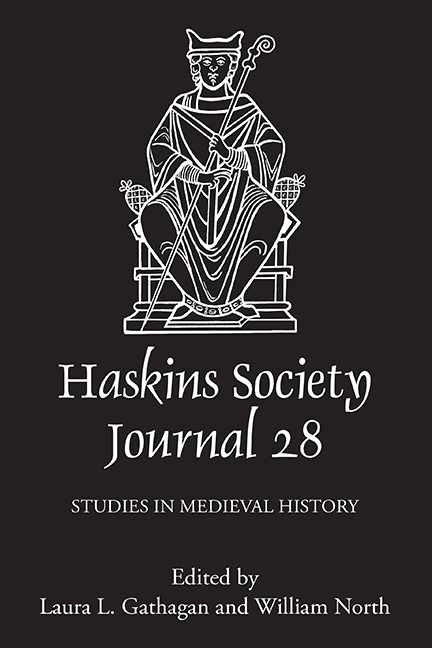Book contents
- Frontmatter
- Contents
- List of Figures and Tables
- Editors' Note
- Abbreviations
- 1 Under the ‘Romans’ or under the Franks? Venice between Two Empires
- 2 Lost and Found: Eadmer's De reliquiis sancti Audoeni as a Cross–Channel Solution to the Canterbury–York Dispute
- 3 Of Lost Libraries and Monastic Memories: Creating the Eleventh-Century Novalesa Miscellany
- 4 The Place of Henry I in English Legal History
- 5 ‘Goliath Thought David Rather Boastful’: Royal Masculinity in Kingless Societies
- 6 Well-Behaved Women? Agnès of Baudement and Agnès of Braine as Female Lords and Patrons of the Premonstratensian Order
- 7 ‘Videmus nunc per speculum’: The Mysticism and Naturalism of the Twelfth-Century imago mundi
- 8 The Norman Kings of Africa?
- 9 Punishing Adultery: Private Violence, Public Honor, Literature, and the Law
5 - ‘Goliath Thought David Rather Boastful’: Royal Masculinity in Kingless Societies
Published online by Cambridge University Press: 23 August 2019
- Frontmatter
- Contents
- List of Figures and Tables
- Editors' Note
- Abbreviations
- 1 Under the ‘Romans’ or under the Franks? Venice between Two Empires
- 2 Lost and Found: Eadmer's De reliquiis sancti Audoeni as a Cross–Channel Solution to the Canterbury–York Dispute
- 3 Of Lost Libraries and Monastic Memories: Creating the Eleventh-Century Novalesa Miscellany
- 4 The Place of Henry I in English Legal History
- 5 ‘Goliath Thought David Rather Boastful’: Royal Masculinity in Kingless Societies
- 6 Well-Behaved Women? Agnès of Baudement and Agnès of Braine as Female Lords and Patrons of the Premonstratensian Order
- 7 ‘Videmus nunc per speculum’: The Mysticism and Naturalism of the Twelfth-Century imago mundi
- 8 The Norman Kings of Africa?
- 9 Punishing Adultery: Private Violence, Public Honor, Literature, and the Law
Summary
A medieval king was a man par excellence: to be a good ruler he had to be victorious in battle, just in judgment, displaying a sternness tempered occasionally by mercy, a good son of the church. Manliness, except that of monks, was distinguished by strong passions, but for a man to be completely subject to those passions, rather than keeping them in check where appropriate, was feminine; kings' passions were outsize, and when not controlled they could be especially destructive. Kings served as models, good or bad, for other secular men, and chroniclers who wrote about them often used them as exemplars.
In most medieval societies monarchy was a given; although there was plenty of discussion of how a king should behave, it was taken for granted that there should be a king. This paper examines three exceptions to the near ubiquity of kingship, and how ideal kingship was envisioned at these three kingless conjunctures, by looking comparatively at the treatment of the figure of King David. David was in many ways the ideal medieval man in both Jewish and Christian traditions. His bravery and prowess were shown in his defeat of Goliath as well as in many other battles. His loyalty appeared in his relations with Saul and Jonathan. His creative gifts appeared in his authorship of the Psalms and in his performance of musical instruments and dance. His just judgment appeared in his treatment of his subordinates and enemies, stern but merciful. His reproductive achievements were apparent from the many sons he had with his various wives. As men with strong passions were prone to do, David sinned, both sexually with Bathsheba and as a consequence in sending her husband Uriah to his death. The sexual sin was somewhat excusable, as was so often the case with elite men in the Middle Ages, but it also allowed David to be a prominent figure of repentance (hence the attribution to him of the penitential psalms). And, of course, he was singled out by God, as the ancestor of the Messiah, a prophecy which Christians held had been fulfilled and Jews still awaited.
- Type
- Chapter
- Information
- The Haskins Society JournalStudies in Medieval History, pp. 83 - 100Publisher: Boydell & BrewerPrint publication year: 2017

